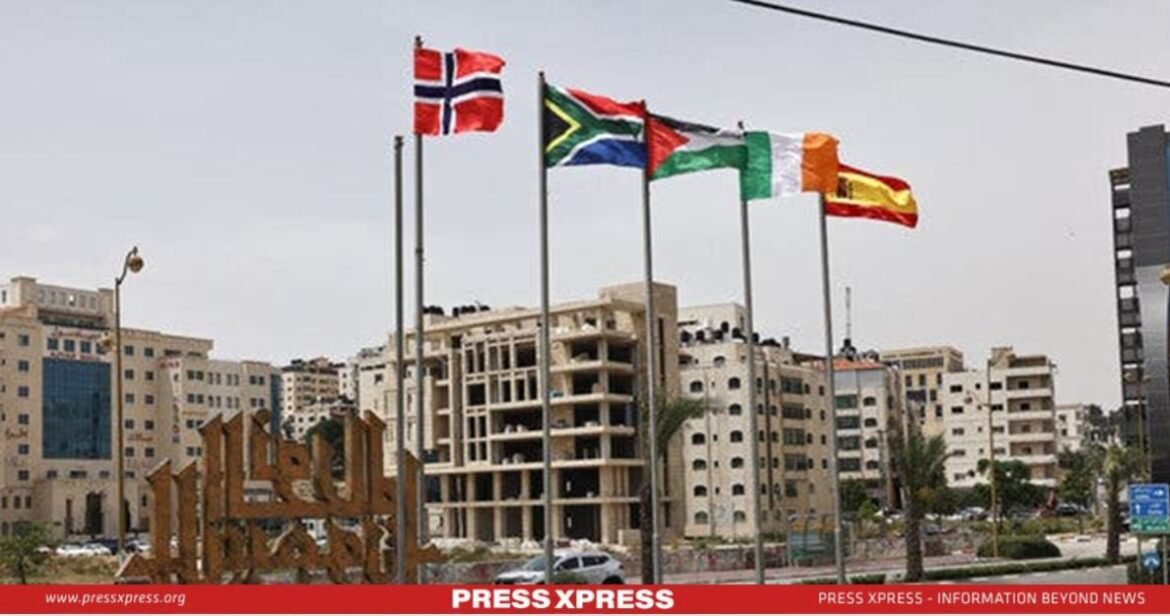Key highlights:
- On Tuesday,28 May 2024, 3 European nations—Spain, Norway, and Ireland—officially recognized an independent Palestinian state
- In a televised address from Madrid, Spanish Prime Minister Pedro Sánchez announced, “This is a historic decision with a singular aim: to help Israelis and Palestinians achieve peace”
- Spain has suggested considering sanctions against Israel for its actions in Gaza
At least to see or feel that the whole Europe is not sleeping over the Palestinian statehood to get establish for making the people independent from Isralei repression. With a remakable joint voice, on Tuesday, 28 May 2024, three European nations—Spain, Norway, and Ireland—officially recognized an independent Palestinian state, drawing sharp criticism from Israel, which continues its military offensive in Gaza. These moves, though largely symbolic, signal a rebuke to Israel amid increasing international frustration over its prolonged occupation of Palestinian territories and its current military actions in Gaza.
You can also read: Why Israel is Furious Over some EU Countries Recognition of Palestine
The recognition comes in the wake of global outrage over an Israeli airstrike on Sunday that killed dozens at a camp for displaced Palestinians in Rafah, despite international pleas for Israel to curb its offensive in southern Gaza.
While many countries have already recognized Palestinian statehood, the joint decision by two European Union countries, along with Norway, carries significant weight, especially given the growing casualties in Gaza and the historical reluctance of most Western European countries and the United States to take such a step-in solidarity with Israel. This move may also prompt additional actions at the United Nations, further deepening Israel’s isolation.
What Did the Trio Nation Announce for Palestine?

In a televised address from Madrid, Spanish Prime Minister Pedro Sánchez announced, “This is a historic decision with a singular aim: to help Israelis and Palestinians achieve peace.”
The Palestinian flag was raised outside Leinster Housein Dublin, the seat of Ireland’s parliament. Irish Prime Minister Simon Harris expressed hope that this gesture would send a message of solidarity to the Palestinian people. “In their darkest hour, Ireland stands with them,”he told lawmakers after his Cabinet’s formal approval of the decision.
Norwegian Foreign Minister Espen Barth Eide declared in a statement, “For more than 30 years, Norway has been a staunch advocate for a Palestinian state. Today, with Norway’s official recognition of Palestine as a state, we mark a significant milestone in the relationship between Norway and Palestine.”
Moreover, Ireland’s government announced plans to appoint an ambassador and establish a full embassy in Ramallah, located in the West Bank. Similarly, Norway will elevate its diplomatic office in the West Bank to embassy status. Meanwhile, Spain stated it will keep its consulate in Jerusalem for the time being, despite Israel’s declaration that the consulate will not be permitted to serve Palestinians.
Possible Negative Repercussions for Israel
In 2022, Israel’s exports to Spain amounted to approximately $2.1 billion, while imports from Spain were around $1.7 billion. Israeli exports to Norway were about $0.4 billion, with imports at $0.3 billion. Exports to Ireland were approximately $0.2 billion, with imports around $0.15 billion. A significant impact on trade relations could cost Israel up to $4.75 billion annually if these diplomatic tensions lead to a major reduction in trade.
Spain has already suggested sanctions against Israel for its actions in Gaza. If trade sanctions or boycotts are imposed by these countries, Israel could face additional financial losses. For example, a 10% reduction in trade with these countries would result in an annual loss of around $475 million.
Tourism might also be affected, with fewer tourists from Spain, Norway, and Ireland visiting Israel due to political sentiments. In 2022, Israel received around 4.5 million tourists, with a notable proportion coming from Europe. A 10% decrease in European tourists could result in significant revenue losses.

Additionally, this move highlights the Middle East issue ahead of the European Parliament elections scheduled for June 6-9.
What Does Increased Recognition Mean for Palestine?
In practical terms, the impact is limited. However, increased recognition from the international community will boost the influence of Palestinian diplomats in negotiations and summits. It will also enable Palestine to enter into bilateral agreements as an independent state.
Despite this, Palestine’s access to international financial systems remains restricted. According to the International Monetary Fund, the Palestinian Authority (PA) cannot access international capital markets, meaning any budget shortfall not covered by aid through Israel must be addressed by the PA itself. Gaza remains entirely reliant on aid.

Still a Long Road to Statehood
Israel, as the occupying power, holds the authority to determine Palestine’s statehood. However, Ireland, Norway, Spain, and the 143 nations that have recognized Palestine aspire that international pressure on Israel will prompt a reconsideration of its commitments made in the Oslo Accords of the 1990s, wherein it pledged to pursue a two-state solution.
For years, Palestinians have aspired to establish their own sovereign state encompassing Gaza, the West Bank, and east Jerusalem, territories seized by Israel in the 1967 Middle East conflict.
While the notion of a contiguous land passage connecting Gaza and the West Bank via Israel has been broached in past peace dialogues, meaningful and substantial negotiations for peace have been absent for over 15 years.
In the aftermath of Spain, Norway, and Ireland’s historic recognition of Palestine as an independent state, the geopolitical landscape of the Middle East seems poised for a shift.
As international pressure mounts, the question arises: Will this collective action inspire more nations to stand in solidarity with Palestine, or will it deepen the existing fault lines in an already fragile region?



